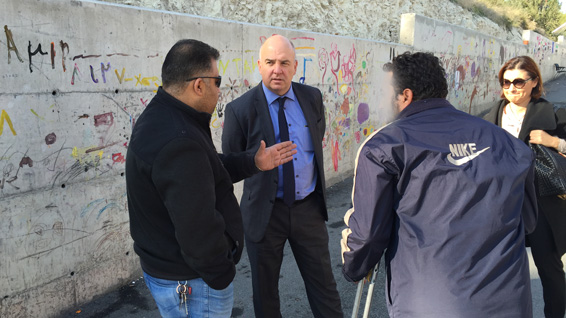“The readiness of Cyprus to receive asylum seekers in the context of the EU relocation scheme is promising. However, I remain seriously concerned about the grave shortcomings of the national asylum system. The authorities need to redouble their efforts to improve reception conditions and fully align domestic asylum procedures with European human rights standards” said today Nils Muižnieks, the Council of Europe Commissioner for Human Rights, at the end of his five-day visit to Cyprus.
The Commissioner visited the island’s only reception centre for asylum seekers with a capacity of up to 400 asylum seekers. Located near the remote village of Kofinou, this centre depends primarily upon EU funds and UNHCR support and is seriously understaffed. “The Cypriot authorities are urged to design long-term reception policies and match them with adequate funding for their implementation. I am also concerned by the lack of legal assistance for asylum seekers and the often excessive length of the asylum procedure” added Commissioner Muižnieks. “Most of the asylum seekers are granted subsidiary protection, which excludes them from enjoying their right to family reunification. The very few who are granted refugee status also face difficulties because of the lack of integration policies and the very long and complicated naturalisation procedures”. The Commissioner noted that “refugees and beneficiaries of subsidiary protection form part of Cypriot society. In view of the expected reunification of the island, it is all the more important for the authorities to draw upon the Council of Europe’s expertise and step up their efforts to enhance all migrants’ integration and social cohesion, promote tolerance and eradicate hate speech and other forms of hate crime”.
The Commissioner welcomed the end of the practice of detaining Syrian asylum seekers. However, detention of failed asylum seekers and of other migrants in view of their deportation is widespread. “I welcome the reduction by half of the detention capacity of the Menoyia migrant detention centre, in line with the CPT recommendations. However, I am worried about the insufficient social and psychological support offered to detainees, as well as the prolonged and sometimes repeated detention of migrants without reasonable prospect of removal. I call on the authorities to apply alternatives to detention in order to avoid excessively long deprivation of migrants’ liberty” stressed the Commissioner.
The economic crisis and austerity measures have adversely impacted on the population of Cyprus. The Commissioner met with some of the numerous Cypriots now forced to rely on NGO assistance to make ends meet. Certain social groups are particularly vulnerable, especially migrant children and single parent families. Civil society organisations and national human rights structures drew the Commissioner’s attention to the increase of psychological stress within families, as well as of domestic violence. “In this challenging social context, I welcome the recent signature by Cyprus of the Istanbul Convention on preventing and combating violence against women and domestic violence and I call on the authorities to ratify this important Council of Europe treaty without further delay”.
Whilst welcoming the establishment of a Guaranteed Minimum Income scheme (GMI), the Commissioner expressed his concern about its implementation. “In practice, the procedures appear to be excessively lengthy and complicated. I urge the authorities to redress this situation and make it possible for the social services to process promptly and adequately the GMI applications” said the Commissioner. He also called on the authorities to conduct human rights - including gender equality - impact assessments of all austerity measures, as well as to consult with national human rights structures and civil society organisations and experts before embarking upon their implementation.
Lastly, the Commissioner visited the anthropological laboratory of the Committee on Missing Persons (CMP). “There are still more than 1 300 Greek and Turkish Cypriots missing. This is a major humanitarian and human rights issue and key for the on-going confidence-building and reconciliation efforts. I fully support the CMP and its excellent work and urge both parties to continue working together in order to end the decades-long suffering of the missing persons’ families”.



